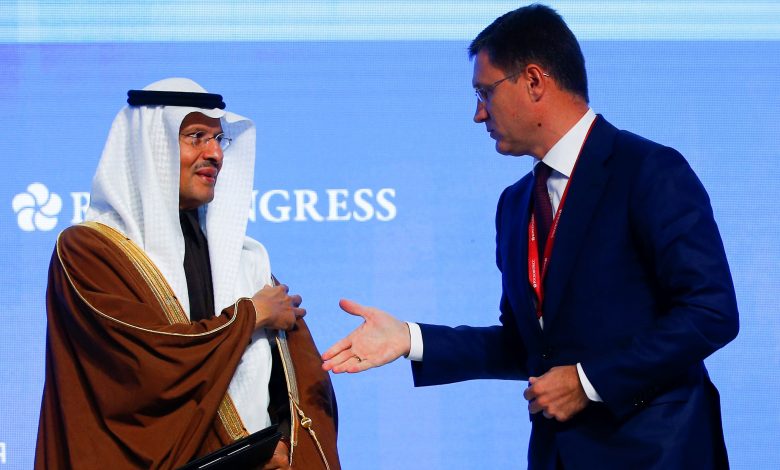What a price war means for the US, Saudi Arabia and Russia

[ad_1]
An all-out oil price war has created an “unprecedented” situation in energy markets, analysts told CNBC Monday, with traders impatiently waiting to see which of the world’s largest oil producers will blink first.
It comes after OPEC and non-OPEC allies, sometimes referred to as OPEC+, failed to agree on the terms of deeper supply cuts late last week.
The fallout between OPEC kingpin Saudi Arabia and non-OPEC leader Russia has kickstarted an oil price war, with crude futures on track to register their biggest daily rout since the first Gulf War in 1991.
International benchmark Brent crude traded at $35.92 Monday morning, down more than 20%, while U.S. West Texas Intermediate (WTI) stood at $32.33, around 22% lower. Brent futures were down more than 30% at one stage in the session, before paring some of their losses.
“We are experiencing, within a short period of time, a demand shock with corona and a supply shock now with OPEC,” Johannes Benigni, chairman and founder of JBC Energy Group, told CNBC’s “Squawk Box Europe” on Monday.
“I mean, figuring that out is absolutely amazing, we are making history here. You can call it now a world war of oil. It is not that actually Saudi Arabia is taking on Russia which everyone is talking about. They may do that, but Russia always said they want to take on a little bit more of the shale industry.”
“By Saudi Arabia actually now declaring war, they are front-running the Russians in declaring war on U.S. shale,” Benigni said.
US oil industry ‘will certainly take the brunt of the pain’
On Saturday, Saudi Arabia announced massive discounts to its official selling prices for April, Reuters reported, with the oil-rich kingdom preparing to ramp up production above the 10 million barrels per day (bpd) mark. Riyadh currently pumps 9.7 million bpd but it has the capacity to increase production up to 12.5 million bpd.
Saudi Arabia’s decision to cut prices came less than 24 hours after a breakdown in talks with Russia at OPEC’s headquarters in Vienna, Austria.
On Thursday, OPEC recommended additional production cuts of 1.5 million bpd starting in April and extending until the end of the year. But OPEC-ally Russia rejected the additional cuts when the broader energy alliance met on Friday.
The meeting also concluded with no directive about the production cuts that are currently in place but set to expire at the end of the month.
On leaving the meeting, Russian Energy Minister Alexander Novak told reporters that it meant OPEC+ producers could pump what they like from April 1.
Russian Energy Minister Alexander Novak and Saudi Energy Minister Abdulaziz Bin Salman sign documents during a ceremony following a meeting of Russian President Vladimir Putin with Saudi Arabia’s King Salman in Riyadh, Saudi Arabia, on October 14, 2019.
ALEXEY NIKOLSKY | SPUTNIK | AFP via Getty Images
Chris Midgley, head of global analytics at S&P Global Platts, said Sunday that “unprecedented conditions” had created a situation where oil traders will be looking to see which producer blinks first.
“While low prices will test Saudi fiscal balances, they have the lowest cost barrels and with low debt can pull on sovereign reserves and take the pain.”
“Russia may simply allow the Rouble to slide in order to sustain flow or Roubles into their economy while U.S. Shale will certainly take the brunt of the pain — their production is unlikely to change quickly with much activity already committed and significant volumes hedged and protected,” Midgely said.
“However, some producers, who have used more sophisticated collars for their hedging strategy, could find themselves in all sorts of difficulty,” he added.
‘Russia will not sustain this for much longer’
The unfolding of events is reminiscent of 2014 when Saudi Arabia, Russia and the U.S. competed for market share in the oil industry. As production escalated, prices plummeted — and some see prices heading back to those lows.
The Gulf Cooperation Council (GCC) has “substantial” foreign currency reserves, Ryan Lemand, senior executive officer at ADS Investment Solutions said Monday, putting countries in the Middle East at an advantage when it comes to withstanding a period of lower oil prices.
“It can sustain one year (or) two years of a strategy like that. Others cannot. I think Russia will not sustain this for much longer and I think Russia will come back to OPEC+ just like it did previously a few years ago,” Lemand told CNBC’s “Capital Connection.”
“So, this will not last long for competitors of the GCC. I’m not worried about the GCC, I’d be more worried about the others,” he added.
— CNBC’s Pippa Stevens contributed to this report.
Source link






